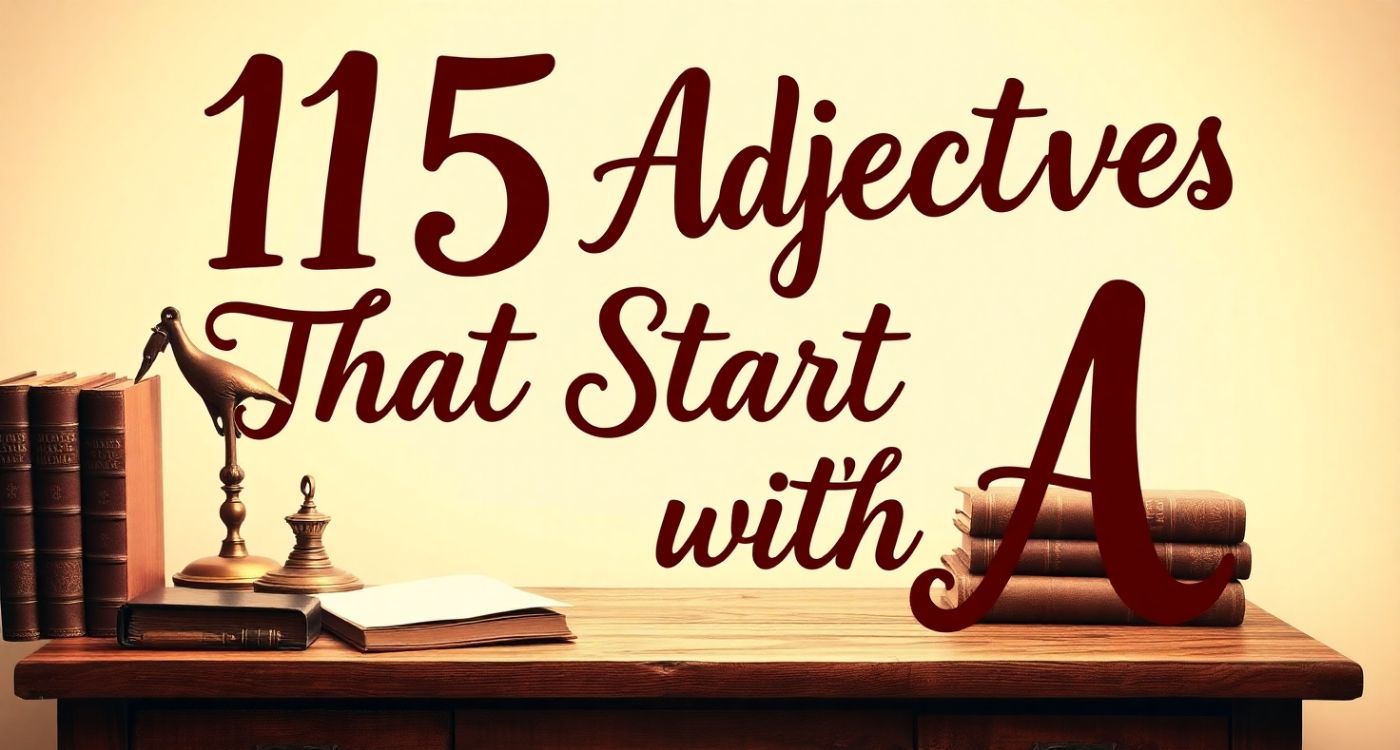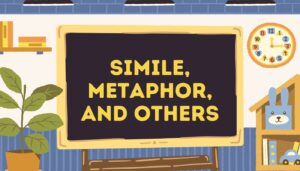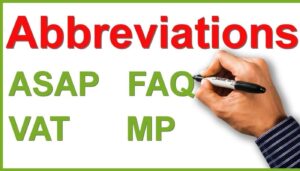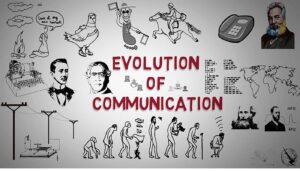Have you ever found yourself stuck trying to describe something and just couldn’t find the perfect word? Or perhaps you’ve wanted to add more flair to your writing or speech? Whether you’re looking to elevate your professional communication, express yourself creatively, or simply improve your vocabulary, adjectives are an essential part of our language toolkit.
And when it comes to adjectives, the letter “A” offers a wealth of vivid and diverse options to choose from.
In this article, we’ll explore 25 adjectives starting with the letter A that can enrich your vocabulary, along with their meanings and practical examples. Let’s dive in!
Why Adjectives Matter
Adjectives are powerful. They allow us to add detail, emotion, and nuance to our descriptions. A simple sentence can transform from mundane to captivating just by selecting the right adjectives.
Think about the difference between “The car is fast” and “The car is agile and lightning-fast.” By using adjectives strategically, we create more vivid images, making it easier for others to connect with our message.
Whether you’re writing an essay, drafting an email, or having a casual conversation, using strong adjectives can make your language more engaging and effective. Let’s take a look at some adjectives starting with the letter “A” that you can start using today.
Positive Adjectives Starting with A
These adjectives convey positive qualities and can help uplift your language.
- Adorable: Charming or delightful in a way that inspires affection.
- Example: “The puppy’s adorable antics had everyone laughing.”
- Adventurous: Willing to take risks or try out new experiences.
- Example: “She had an adventurous spirit, always eager to explore new places.”
- Amazing: Causing great surprise or admiration; astonishing.
- Example: “The view from the mountaintop was absolutely amazing.”
- Authentic: Genuine, real, and true to its origin or nature.
- Example: “He made an authentic effort to understand different cultures.”
- Ambitious: Eager to achieve success or reach high goals.
- Example: “Her ambitious nature pushed her to complete the project ahead of schedule.”
Descriptive Adjectives for Precision
These adjectives allow you to describe things with more precision.
- Aggressive: Strong or intense in action, often with a sense of forcefulness.
- Example: “The aggressive marketing campaign led to increased sales.”
- Altruistic: Unselfishly concerned for the well-being of others.
- Example: “Her altruistic actions made her beloved in the community.”
- Angular: Having sharp angles or corners.
- Example: “The building had an angular design, unlike anything seen before.”
- Ample: More than enough; abundant.
- Example: “The room was filled with ample light from the large windows.”
- Arid: Dry, lacking moisture or interest.
- Example: “The desert’s arid climate made it nearly impossible to survive.”
Adjectives for Expressing Emotion
Expressing emotions can bring a personal touch to your language. These adjectives are perfect for describing feelings and moods.
- Amazed: Filled with wonder or surprise.
- Example: “She was amazed at the breathtaking performance.”
- Anxious: Worried or uneasy about something.
- Example: “He felt anxious before his big presentation.”
- Apprehensive: Nervous or fearful about what might happen.
- Example: “I was apprehensive about traveling alone for the first time.”
- Affectionate: Showing fondness or tenderness.
- Example: “The affectionate hug made me feel welcome and safe.”
- Anguished: Experiencing severe pain, distress, or sorrow.
- Example: “His anguished cry echoed through the empty hall.”
Academic and Intellectual Adjectives
These adjectives can add depth to your academic writing or intellectual conversations.
- Analytical: Using logical reasoning and critical thinking.
- Example: “The scientist’s analytical approach led to groundbreaking discoveries.”
- Astute: Having sharp judgment or insight.
- Example: “Her astute observations in the meeting earned her a promotion.”
- Abstract: Not concrete or easily defined; theoretical.
- Example: “The philosopher’s abstract ideas challenged conventional thinking.”
- Academic: Related to education, learning, or intellectual pursuits.
- Example: “The academic paper was well-researched and cited numerous sources.”
- Articulate: Able to express thoughts clearly and effectively.
- Example: “The spokesperson gave an articulate explanation of the company’s vision.”
Fun and Quirky Adjectives
Sometimes, we need adjectives that add a playful or unique twist to our communication.
- Absurd: Wildly unreasonable, illogical, or ridiculous.
- Example: “The idea of jumping off a cliff into a pool was utterly absurd.”
- Animated: Full of life and energy, often with motion or expression.
- Example: “The animated characters in the movie captured the audience’s imagination.”
- Arrogant: Overbearing or self-important.
- Example: “His arrogant behavior alienated his colleagues.”
- Audacious: Bold or daring, often in a shocking way.
- Example: “Her audacious move to start her own business was an inspiration.”
- Atypical: Not typical or usual; unusual.
- Example: “The professor’s atypical teaching methods made the class engaging.”
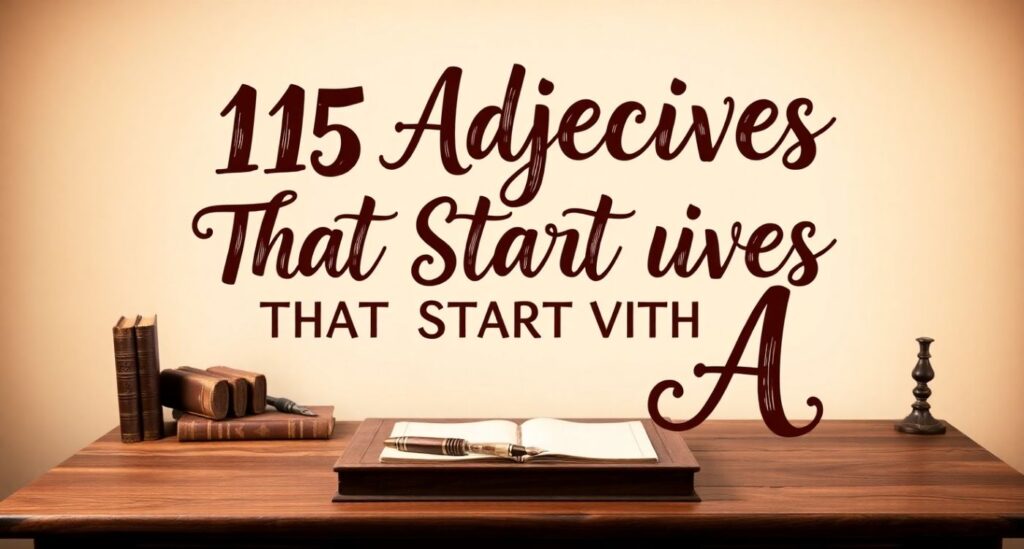
Positive and Uplifting Adjectives
- Admirable: Deserving respect or admiration.
- Example: “Her admirable dedication to volunteering inspires others.”
- Aesthetic: Concerned with beauty or the appreciation of beauty.
- Example: “The museum’s aesthetic design attracted visitors from all over.”
- Agreeable: Pleasant, nice, or willing to agree.
- Example: “The pleasant weather made the day even more agreeable.”
- Amicable: Friendly and peaceful in nature.
- Example: “The two companies reached an amicable agreement after a lengthy negotiation.”
- Affable: Friendly, good-natured, and easy to talk to.
- Example: “His affable nature made him very popular among his peers.”
Descriptive Adjectives for Specific Qualities
- Angelic: Having the qualities of an angel; pure and kind.
- Example: “Her angelic voice filled the room with serenity.”
- Artistic: Creative, imaginative, and skilled in the arts.
- Example: “The artist’s work was undeniably artistic, full of color and emotion.”
- Aloof: Distant or detached in manner; unfriendly.
- Example: “Despite her aloof appearance, she was quite friendly once you got to know her.”
- Ancient: Very old; belonging to a distant past.
- Example: “The ancient ruins told stories of civilizations long gone.”
- Arid: Extremely dry; lacking in moisture or interest.
- Example: “The arid desert provided little in terms of natural resources.”
Intellectual and Academic Adjectives
- Abstract: Not concrete; theoretical, difficult to understand.
- Example: “The abstract concept of quantum physics can be challenging for many students.”
- Analytical: Skilled at breaking down and examining something logically.
- Example: “Her analytical skills helped her solve complex problems efficiently.”
- Articulate: Able to express oneself clearly and effectively.
- Example: “The professor was articulate in explaining difficult concepts.”
- Astounding: Very surprising or impressive; causing astonishment.
- Example: “The astounding results of the experiment shocked the scientific community.”
- Academic: Related to education, learning, or scholarly pursuits.
- Example: “His academic achievements earned him a scholarship to a prestigious university.”
Emotional and Feeling Adjectives
- Angry: Feeling or showing strong displeasure or resentment.
- Example: “She was angry when she found out about the mistake.”
- Amused: Finding something funny or entertaining.
- Example: “The children were amused by the clown’s tricks.”
- Alone: Having no one else present; solitary.
- Example: “He preferred being alone to think clearly.”
- Apathetic: Showing little or no emotion; indifferent.
- Example: “She felt apathetic toward the political debate and chose not to participate.”
- Afraid: Feeling fear or apprehension.
- Example: “He was afraid of the dark and couldn’t sleep without a nightlight.”
Adjectives for Character and Behavior
- Aggressive: Ready to attack or confront; assertive in a harsh way.
- Example: “His aggressive behavior during the meeting raised concerns.”
- Altruistic: Selflessly concerned for the well-being of others.
- Example: “Her altruistic efforts helped improve the lives of many people.”
- Arrogant: Having an exaggerated sense of one’s own importance.
- Example: “The arrogant attitude of the manager caused tension in the office.”
- Authentic: Genuine and true to its origins.
- Example: “The chef used only authentic Italian ingredients for the dish.”
- Astonishing: Very surprising or amazing; hard to believe.
- Example: “The magician’s astonishing trick left the audience speechless.”
Physical Appearance Adjectives
- Attractive: Pleasing or appealing to the eye.
- Example: “She has an attractive smile that lights up the room.”
- Angular: Having sharp angles; lean with distinct, jutting bones.
- Example: “His angular features gave him a striking, model-like appearance.”
- Aged: Having lived for a long time; showing the effects of age.
- Example: “The aged oak tree stood tall and strong in the forest.”
- Aesthetic: Related to beauty or artistic taste.
- Example: “The aesthetic design of the building made it a popular tourist destination.”
- Abundant: Present in large quantities; more than enough.
- Example: “The garden was abundant with vibrant flowers and greenery.”
Adjectives for Size, Amount, and Extent
- Ample: More than enough; abundant.
- Example: “There was ample room for everyone at the party.”
- Average: Typical, standard, or ordinary.
- Example: “Her grades were average, but she excelled in extracurricular activities.”
- Astronomical: Extremely large or high.
- Example: “The cost of the new house was astronomical compared to the market average.”
- Acute: Sharp or intense, often referring to a situation or condition.
- Example: “He experienced acute pain in his leg after the fall.”
- Abnormal: Deviating from what is normal or typical.
- Example: “The doctor was concerned about the abnormal test results.”
Unique and Uncommon Adjectives
- Absurd: Wildly unreasonable, illogical, or ridiculous.
- Example: “The absurd idea of climbing a tree during a storm was rejected immediately.”
- Ageless: Not showing the effects of age; timeless.
- Example: “Her ageless beauty made her a popular model for many years.”
- Alarming: Causing concern or worry.
- Example: “The alarming news about the fire spread quickly through the town.”
- Antique: Old, typically referring to objects with historical value.
- Example: “They inherited an antique chair that had been passed down through generations.”
- Amorphous: Lacking a definite shape or structure.
- Example: “The clouds were amorphous, constantly shifting and changing.”
Adjectives for Time and Frequency
- Annual: Occurring every year.
- Example: “The annual meeting was held in January.”
- Ancient: Very old; belonging to a distant past.
- Example: “They discovered an ancient manuscript in the library archives.”
- Arising: Emerging or coming into being.
- Example: “The arising trend in technology has sparked many debates.”
- Anticipated: Expected or predicted with eagerness.
- Example: “The highly anticipated movie premiered last week.”
- Asynchronous: Not occurring at the same time; out of sync.
- Example: “The asynchronous communication style of the team made coordination difficult.”
Positive and Encouraging Adjectives
These adjectives add a touch of positivity and brightness to your speech.
- Affectionate: Showing fondness or tenderness.
- Example: “She gave him an affectionate hug before he left.”
- Alive: Full of life; lively.
- Example: “The festival was alive with music and laughter.”
- Appreciative: Grateful or thankful.
- Example: “He was appreciative of her thoughtful gesture.”
- Audible: Able to be heard.
- Example: “The sound of the bell was barely audible over the noise.”
- Adventurous: Willing to take risks or try out new experiences.
- Example: “She’s an adventurous traveler, always exploring new destinations.”
Descriptive Adjectives for Appearance
These adjectives help describe physical traits and qualities.
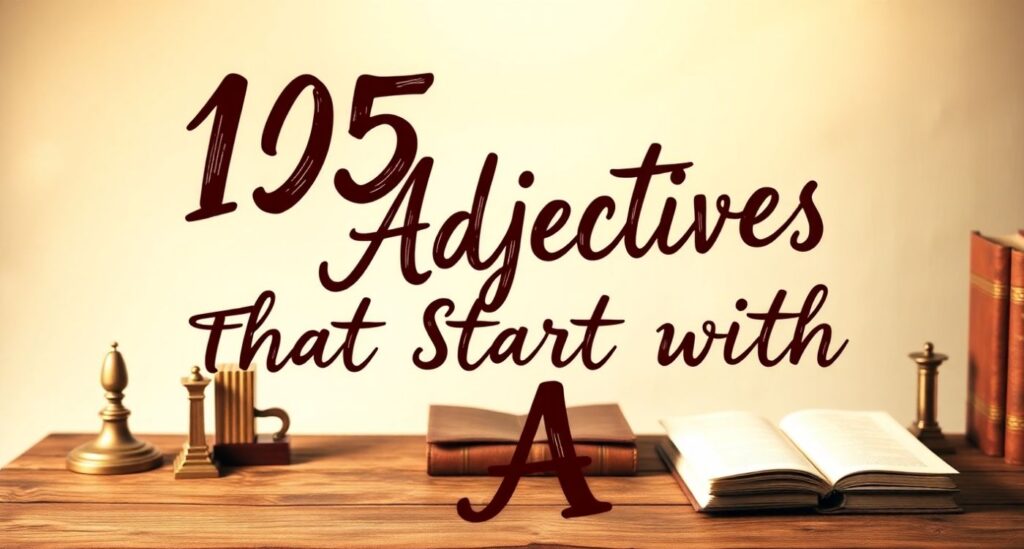
- Angular: Having sharp angles or pointed shapes.
- Example: “His angular features made him stand out in the crowd.”
- Average: Ordinary or typical in appearance.
- Example: “She had an average build, but her personality was anything but.”
- Aesthetic: Pertaining to beauty or artistic taste.
- Example: “The aesthetic value of the painting was beyond words.”
- Anatomical: Related to the structure of the body.
- Example: “The anatomical design of the statue was both detailed and accurate.”
- Aloof: Distant in manner; not friendly.
- Example: “She appeared aloof during the meeting, but was attentive.”
Adjectives for Size, Amount, and Extent
These adjectives help describe the scale or magnitude of something.
- Abundant: Present in large quantities; plentiful.
- Example: “The garden was abundant with vibrant flowers.”
- Astounding: Very surprising or impressive.
- Example: “The astounding results of the experiment took everyone by surprise.”
- Average: The usual or common level.
- Example: “The average temperature in the city is mild year-round.”
- Alarming: Causing concern or fear.
- Example: “The alarming rise in pollution levels requires immediate action.”
- Astonishing: Extremely surprising or impressive.
- Example: “The athlete’s astonishing performance broke multiple records.”
Emotional and Mood-Related Adjectives
These adjectives help you express feelings and emotional states.
- Anguished: Filled with pain or distress.
- Example: “He looked anguished after hearing the news of the loss.”
- Anxious: Nervous or uneasy about something.
- Example: “She was anxious before her big presentation.”
- Apathetic: Lacking interest or enthusiasm.
- Example: “He felt apathetic about the decision and didn’t voice an opinion.”
- Amused: Finding something funny or entertaining.
- Example: “She was amused by the children’s playful antics.”
- Apprehensive: Fearful or anxious about something in the future.
- Example: “He felt apprehensive about the upcoming exam.”
Adjectives for Character and Behavior
These adjectives can describe people’s character traits and behavior.
- Arrogant: Overbearing, having a sense of superiority.
- Example: “His arrogant attitude alienated many of his friends.”
- Affable: Friendly and easy to talk to.
- Example: “She was an affable host, making everyone feel comfortable.”
- Authentic: Genuine; true to its original form.
- Example: “The restaurant served authentic Italian pizza.”
- Aggressive: Ready to attack or assertive in a hostile manner.
- Example: “His aggressive sales tactics made customers uncomfortable.”
- Altruistic: Selflessly concerned for the well-being of others.
- Example: “Her altruistic nature drove her to volunteer at the shelter every weekend.”
Adjectives for Condition or State
These adjectives are used to describe the state or condition of an object, person, or situation.
- Acidic: Having the qualities of acid; sour or corrosive.
- Example: “The water in the river became increasingly acidic due to pollution.”
- Absorbent: Capable of soaking up liquids.
- Example: “The towel was highly absorbent and dried off the spill quickly.”
- Afflicted: Affected by a condition, illness, or problem.
- Example: “The village was afflicted by a severe drought.”
- Ailing: In poor health or suffering from illness.
- Example: “The ailing patient was cared for by a team of doctors.”
- Adaptable: Able to adjust easily to new conditions.
- Example: “Her adaptable nature allowed her to succeed in a fast-paced work environment.”
Intellectual and Academic Adjectives
These adjectives are often used in academic or intellectual contexts.
- Abstract: Existing as a concept, not a physical object.
- Example: “The abstract ideas presented in the lecture were thought-provoking.”
- Astute: Quick to notice or understand things.
- Example: “His astute observations impressed the entire team.”
- Accomplished: Highly skilled or successful in a particular area.
- Example: “She is an accomplished violinist, having performed internationally.”
- Authoritative: Commanding respect or trust due to expertise.
- Example: “The authoritative study on climate change was cited by experts worldwide.”
- Analytical: Able to examine and interpret details methodically.
- Example: “Her analytical thinking allowed her to solve complex problems.”
Fun and Creative Adjectives
These adjectives bring out creativity and fun in your language.
- Amorphous: Lacking a definite shape or form.
- Example: “The artist created an amorphous sculpture that could be interpreted in many ways.”
- Absurd: Wildly unreasonable or ridiculous.
- Example: “The absurd suggestion of eating ice cream for dinner was met with laughter.”
- Alarming: Causing fear or concern.
- Example: “The alarming increase in traffic accidents urged the city to take action.”
- Atypical: Not typical; unusual.
- Example: “His atypical approach to the problem yielded impressive results.”
- Audacious: Daring, bold, or unconventional.
- Example: “Her audacious plan to launch a startup in a competitive market paid off.”
Adjectives for Time and Frequency

These adjectives help describe time-related events.
- Annual: Occurring once a year.
- Example: “The annual conference will be held in May.”
- Anticipated: Expected with eagerness or excitement.
- Example: “The anticipated release of the new movie had fans buzzing.”
- Asynchronous: Not occurring at the same time; out of sync.
- Example: “The team worked in asynchronous shifts to ensure continuous production.”
- Antiquated: Outdated or old-fashioned.
- Example: “The antiquated technology was no longer viable for the company’s needs.”
- Accelerated: Happening at a faster pace than normal.
- Example: “The accelerated schedule for the project meant working overtime.”
Adjectives for Strength and Power
These adjectives are used to convey physical or metaphorical strength and power.
- Aggressive: Ready to assert dominance or engage in confrontation.
- Example: “The aggressive tactics in the negotiation led to a successful deal.”
- Athletic: Having a strong, fit, and active body.
- Example: “He’s an athletic individual, participating in marathons regularly.”
- Almighty: Having ultimate power or strength.
- Example: “The almighty force of the storm uprooted trees and caused destruction.”
- Abrasive: Harsh or rough in manner or texture.
- Example: “The abrasive personality of the manager made communication difficult.”
- Arduous: Requiring significant effort or endurance.
- Example: “The arduous journey through the mountains was exhausting but rewarding.”
Vocabulary Quiz: Adjectives Starting with “A”
Test your knowledge of the adjectives starting with “A” from the article! This quiz will help reinforce the vocabulary you’ve learned. Choose the best answer for each question, and check the answers below.
1. Which of the following is the best definition of “affectionate”?
a) Showing indifference
b) Showing fondness or tenderness
c) Being distant in behavior
d) Displaying anger
Answer: b) Showing fondness or tenderness
2. What does the adjective “angular” describe?
a) A smooth and rounded shape
b) Having sharp angles or pointed shapes
c) Lacking form or structure
d) Having a soft and curved appearance
Answer: b) Having sharp angles or pointed shapes
3. Which of the following would best describe a person with “anxious” feelings?
a) Calm and relaxed
b) Nervous or uneasy about something
c) Completely indifferent
d) Overconfident and relaxed
Answer: b) Nervous or uneasy about something
4. Which adjective is used to describe something as very surprising or impressive?
a) Average
b) Abundant
c) Astonishing
d) Apathetic
Answer: c) Astonishing
5. Which adjective means “genuine and true to its original form”?
a) Altruistic
b) Aggressive
c) Authentic
d) Absorbent
Answer: c) Authentic
6. What does the adjective “altruistic” describe?
a) Selfishly concerned for one’s own needs
b) Selflessly concerned for the well-being of others
c) Hostile and combative
d) Indifferent to others’ needs
Answer: b) Selflessly concerned for the well-being of others
7. If someone is described as “amiable,” they are:
a) Distant and unapproachable
b) Friendly and pleasant
c) Rude and unfriendly
d) Extremely anxious
Answer: b) Friendly and pleasant
8. “Absorbent” is used to describe an object that is:
a) Capable of soaking up liquids
b) Resistant to pressure
c) Easily breakable
d) Lacking in texture
Answer: a) Capable of soaking up liquids
9. Which of the following adjectives would describe a person who is “aggressive”?
a) Shy and withdrawn
b) Mild and cooperative
c) Ready to assert dominance or confront
d) Pleasant and agreeable
Answer: c) Ready to assert dominance or confront
10. “Amorphous” refers to something that is:
a) Lacking a definite shape or form
b) Completely symmetrical
c) Highly structured and detailed
d) Rounded and smooth
Answer: a) Lacking a definite shape or form
11. Which adjective means “having an extremely high level of energy or life”?
a) Alive
b) Abundant
c) Average
d) Anxious
Answer: a) Alive
12. What does the adjective “audible” describe?
a) Impossible to hear
b) Loud and distracting
c) Able to be heard
d) Pleasant and soothing
Answer: c) Able to be heard
13. Which adjective is used to describe something that is “outdated” or “old-fashioned”?
a) Ancient
b) Authentic
c) Atypical
d) Antiquated
Answer: d) Antiquated
14. “Apprehensive” best describes someone who feels:
a) Confident and optimistic
b) Fearful or anxious about the future
c) Unaware of the situation
d) Enthusiastic about new opportunities
Answer: b) Fearful or anxious about the future
15. Which adjective would you use to describe something that is “pleasing or appealing to the eye”?
a) Absurd
b) Artistic
c) Angry
d) Average
Answer: b) Artistic
16. What does the adjective “abstract” mean?
a) Related to beauty or appearance
b) Existing only as a concept, not a physical object
c) Direct and straightforward
d) Having a clear and exact definition
Answer: b) Existing only as a concept, not a physical object
17. Which adjective refers to something “happening once every year”?
a) Annual
b) Anticipated
c) Asynchronous
d) Abundant
Answer: a) Annual
18. “Aggressive” behavior is best described as:
a) Passive and calm
b) Assertive in a hostile or combative way
c) Timid and hesitant
d) Generous and kind
Answer: b) Assertive in a hostile or combative way
19. If something is “audacious,” it is:
a) Timid and cautious
b) Daring, bold, or unconventional
c) Incredibly ordinary
d) Highly reserved
Answer: b) Daring, bold, or unconventional
20. “Apathetic” describes someone who is:
a) Extremely interested and eager
b) Indifferent or lacking interest
c) Full of excitement and energy
d) Extremely emotional and reactive
Answer: b) Indifferent or lacking interest
21. Which adjective would describe a “strong, fit, and active” person?
a) Agile
b) Athletic
c) Altruistic
d) Apprehensive
Answer: b) Athletic
22. What does “alarming” mean?
a) Calm and peaceful
b) Causing concern or fear
c) Lacking interest
d) Filled with excitement
Answer: b) Causing concern or fear
23. “Absurd” is used to describe something that is:
a) Practical and useful
b) Wildly unreasonable or ridiculous
c) Ordinary and typical
d) Easily understandable
Answer: b) Wildly unreasonable or ridiculous
24. “Afflicted” describes someone who is:
a) Suffering from an illness or hardship
b) Enjoying great success
c) In perfect health
d) Very happy
Answer: a) Suffering from an illness or hardship
25. Which adjective means “having an extremely large amount or quantity”?
a) Adequate
b) Average
c) Abundant
d) Abnormal
Answer: c) Abundant
26. “Aloof” means:
a) Friendly and warm
b) Distant and detached
c) Angry and upset
d) Eager to help others
Answer: b) Distant and detached
27. What would “articulate” describe?
a) Someone who is quiet
b) Someone who can express ideas clearly and effectively
c) Someone who is aggressive
d) Someone who is uninformed
Answer: b) Someone who can express ideas clearly and effectively
28. Which adjective describes someone who is “grateful or thankful”?
a) Audacious
b) Altruistic
c) Affectionate
d) Appreciative
Answer: d) Appreciative
29. If a situation is described as “arising,” it means:
a) It has already been resolved
b) It is emerging or coming into being
c) It has been permanently closed
d) It is going unnoticed
Answer: b) It is emerging or coming into being
30. “Adaptable” refers to something or someone that is:
a) Rigid and unchanging
b) Resistant to change
c) Able to adjust easily to new conditions
d) Unaware of changes
Answer: c) Able to adjust easily to new conditions
31. What does “arrogant” describe?
a) Someone who is humble and modest
b) Someone who feels superior to others
c) Someone who is caring and compassionate
d) Someone who avoids attention
Answer: b) Someone who feels superior to others
32. “Absurd” refers to something that is:
a) Highly logical
b) Ridiculous or unreasonable
c) Straightforward and practical
d) Completely ordinary
Answer: b) Ridiculous or unreasonable
33. If someone is described as “agile,” they are:
a) Slow and clumsy
b) Able to move quickly and easily
c) Very tall
d) Weak and frail
Answer: b) Able to move quickly and easily
34. What does “ancient” mean?
a) Very modern
b) Very old; belonging to a distant past
c) In perfect condition
d) Rarely seen
Answer: b) Very old; belonging to a distant past
35. “Atypical” means:
a) Standard or expected
b) Unusual or not typical
c) Common or ordinary
d) Predictable
Answer: b) Unusual or not typical
36. Which of these is most likely to be described as “audible”?
a) A whisper in a noisy room
b) The sound of a mouse walking
c) A loud sound during a thunderstorm
d) The wind blowing in the trees
Answer: c) A loud sound during a thunderstorm
37. “Alarming” events are those that:
a) Are joyful and exciting
b) Cause concern or fear
c) Are irrelevant and unimportant
d) Are exciting and thrilling
Answer: b) Cause concern or fear
38. “Ample” means:
a) Too little
b) More than enough
c) Just enough
d) Insufficient
Answer: b) More than enough
39. “Arduous” best describes a task that is:
a) Simple and easy
b) Challenging and exhausting
c) Fun and enjoyable
d) Unnecessary and irrelevant
Answer: b) Challenging and exhausting
40. “Agile” can describe someone who is:
a) Slow and steady
b) Able to move quickly and easily
c) Weak and fragile
d) Unaware of their surroundings
Answer: b) Able to move quickly and easily
Wrapping Up
As you can see, adjectives starting with the letter “A” offer a broad range of meanings and nuances, from the uplifting to the descriptive, emotional, and intellectual. By incorporating these words into your daily language, you can create more engaging and vivid expressions, whether you’re writing, speaking, or simply reflecting on the world around you.
Next time you find yourself in need of a precise or compelling adjective, think of these powerful “A” words and elevate your communication skills. The more diverse your vocabulary, the more you’ll be able to connect with others and express your thoughts with clarity and impact.
What’s your favorite adjective from the list above? How do you plan on using it in your next conversation or piece of writing? The world of adjectives awaits—go ahead and explore!
